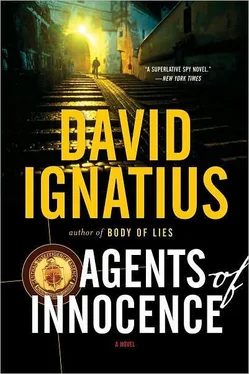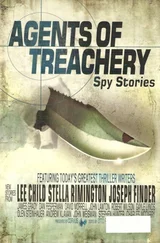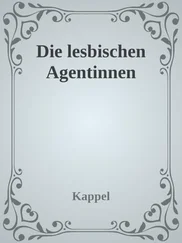David Ignatius - Agents of Innocence
Здесь есть возможность читать онлайн «David Ignatius - Agents of Innocence» весь текст электронной книги совершенно бесплатно (целиком полную версию без сокращений). В некоторых случаях можно слушать аудио, скачать через торрент в формате fb2 и присутствует краткое содержание. Жанр: Шпионский детектив, на английском языке. Описание произведения, (предисловие) а так же отзывы посетителей доступны на портале библиотеки ЛибКат.
- Название:Agents of Innocence
- Автор:
- Жанр:
- Год:неизвестен
- ISBN:нет данных
- Рейтинг книги:3 / 5. Голосов: 1
-
Избранное:Добавить в избранное
- Отзывы:
-
Ваша оценка:
- 60
- 1
- 2
- 3
- 4
- 5
Agents of Innocence: краткое содержание, описание и аннотация
Предлагаем к чтению аннотацию, описание, краткое содержание или предисловие (зависит от того, что написал сам автор книги «Agents of Innocence»). Если вы не нашли необходимую информацию о книге — напишите в комментариях, мы постараемся отыскать её.
Agents of Innocence — читать онлайн бесплатно полную книгу (весь текст) целиком
Ниже представлен текст книги, разбитый по страницам. Система сохранения места последней прочитанной страницы, позволяет с удобством читать онлайн бесплатно книгу «Agents of Innocence», без необходимости каждый раз заново искать на чём Вы остановились. Поставьте закладку, и сможете в любой момент перейти на страницу, на которой закончили чтение.
Интервал:
Закладка:
Barub Atab Adonai Elobeinu…
“In praising God, we say that all life is sacred. In kindling festive lights, we preserve life’s sanctity.”
Levi was crying. So was the code clerk. But Shuval’s voice was strong and full of hope.
“With every holy light we kindle, the world is brightened to a higher harmony. We praise thee, O Lord our God, majestic sovereign of all life who hallows our lives with commandments and bids us kindle festive holy light.”
“Sit down, everyone,” said Shuval’s wife.
Levi looked at the table. The matzoh, because there had been no time fleeing Egypt to make leavened bread. The tender herbs of spring, the green of hope and renewal, to be dipped in the salt water of tears. And the maror, the bitter horseradish root, standing for the bitterness of life in Egypt, and the greater bitterness and pain of the 2,500 years of exile in the Diaspora. And the sweet paste of apples and honey, the mortar with which we build our dreams.
For once, Levi felt that he understood what he was doing in Beirut and remembered that he was part of a very long journey indeed.
16
Beirut; March 1970
Rogers returned home from Kuwait to find Hoffman in an especially cranky mood. A few days earlier, a crisis had erupted in Lebanon between the Christian militia and the Palestinian commandos.
Like so much else in Lebanon, it was a game of tit for tat. Christian gunmen had ambushed a Palestinian funeral procession as it passed through the village of Kahhaleh along the Beirut-Damascus highway. The Christians claimed that the mourners were carrying weapons illegally. Palestinian commandos in the Tal Zaatar refugee camp retaliated by attacking a neighboring Christian suburb. Gunfire had spread to other parts of the city and there were fears that the fighting would escalate.
The lights were still on in Hoffman’s office when Rogers stopped by the embassy on his way in from the airport. The station chief looked exhausted. He was sweaty and unshaven, with a cigarette in his mouth, a cup of coffee in one hand and a telephone in the other.
“How nice of you to join us,” said Hoffman with elaborate politeness when he got off the phone.
Rogers sensed that he was in the doghouse, but he wasn’t sure why.
“If it wouldn’t be too much trouble,” continued Hoffman, “perhaps you could help us with a little intelligence collection, before this whole fucking country goes up in smoke!”
Rogers began to apologize, but the station chief cut him off.
“Save it for the chaplain,” said Hoffman.
“What in the world is going on?” asked Rogers.
“That, my dear boy, depends on who you talk to. If you ask the Ministry of Interior, there are ‘unreliable rumors of civil disturbances in certain areas.’ If you ask people in Dikwana, there’s a God-damn war going on. So, take your pick.”
“Need some help?” asked Rogers.
“How thoughtful of you to ask,” said Hoffman, reverting to his earlier tone of sarcasm. “If it’s not too taxing after your travels, maybe you could contact your little friend in Fatah and find out what in the name of Jesus is going on over there. Seeing as how we’re on the verge of a civil war. If it wouldn’t be too much trouble, that is.”
“Consider it done,” said Rogers. “As soon as I can reach him.”
“There’s one more thing, hotshot,” growled Hoffman. “Headquarters is complaining about a smart-aleck cable that you supposedly sent from Kuwait. Stone has written both of us a polite note in agency-ese. Here’s a brief translation: If you ever pull a stunt like that again, he’ll have your ass! Got it?”
Rogers obediently nodded. So that’s why Hoffman is so agitated, he thought to himself.
“By the way,” called out Hoffman as Rogers was halfway down the hall. “How was your trip?”
Jane Rogers was sitting in the living room, reading to the children, when her husband returned home. She was wearing a tweed skirt and a pullover sweater. In the light of the reading lamp, her face had the stark contrast of a chiaroscuro: the hair black and deep in shadow, the skin white and luminous.
Jane was overjoyed to see her husband. Rogers hadn’t called to tell her when he would be coming home. He usually didn’t, for security reasons. She gave him a long hug and, when it was time to let go, she hugged him again.
“We were a little nervous the last few days,” she said when the children were out of earshot.
“I gather from Frank you’ve had some fireworks,” said Rogers, already beginning to feel guilty.
“We heard gunfire on the Corniche two days ago. The bawab downstairs said it was just a wedding party, but they always say that. Then Binky Garrett from the embassy came by and warned that we should stay indoors at night and stock up on food.”
“Binky is an idiot,” said Rogers.
Rogers noticed then that the apartment had the look of an air-raid shelter. The curtains were drawn tight and the pantry was piled high with canned goods. Stacked in the hall were three cases of mineral water.
“I probably overreacted,” said Jane.
Rogers tried to say that he was sorry, but no words came out. He was mute, silenced by remorse for leaving his family alone and in danger.
“Kids okay?” asked Rogers eventually.
“Fine,” said Jane.
“Mark?”
“He’s fine. He missed his daddy.”
“And Amy? How is Amy?”
Rogers’s heart was racing as he asked the question. The one thing on earth that truly frightened him was the health of his two-year-old daughter.
“She’s better,” said Jane. “The doctor says she’s doing much better.”
“Thank God!” said Rogers. He felt for a moment a sense of lightness, as if a weight had been lifted from his body. But he couldn’t quite believe the good news, and his doubt showed on his face.
“She’s in the other room,” said Jane. “Go see for yourself.”
Rogers walked toward the children’s playroom, brightly painted and cluttered with toys. He carried with him a bag of gifts he had brought from Kuwait.
“Daddy’s home,” called out Rogers in the direction of the play room.
“What did you bring us?” shouted Mark.
The boy raced toward his father. He was dressed in a Boston Red Sox baseball cap and a T-shirt that said “Amherst 198?”
Amy followed, more slowly. She was a beautiful child: curly blond hair, an easy smile, red cheeks, wearing a white summer dress embroidered with flowers. She ran with the choppy, bowlegged steps of a toddler. Halfway to Daddy, she tumbled on the carpet.
Rogers winced. He picked her up and gave her a hug.
“She’s not perfect yet,” explained Jane. “But better.”
“Amy,” said Rogers. “Here’s a present for you.”
He reached into the bag and gave her a handmade doll he had bought in Kuwait, dressed Arab-style in harem pants and a veil. The baby took the doll in her hands and began to remove its clothes. As she was removing the pants, the doll slipped from her fingers and dropped to the floor.
Rogers picked up the doll from the floor and handed it back to his daughter gently.
“You’ll see,” said Jane. “She’s really much steadier.”
Rogers gave his son a poster advertising the Kuwait national soccer team. It showed a camel kicking a soccer ball and bore the legend: “Our Camel Is a Winner!”
“Wow!” said Mark, who was already something of a soccer buff.
Rogers hadn’t the heart to tell his son that the 1970 Kuwait soccer team was one of the worst in the world. Bad even by the modest standards of the Persian Gulf. Their camel, in point of fact, was not a winner.
“So who’s leading the Lebanese Soccer League?” Rogers asked his son, who studied the league tables every morning in the paper.
Читать дальшеИнтервал:
Закладка:
Похожие книги на «Agents of Innocence»
Представляем Вашему вниманию похожие книги на «Agents of Innocence» списком для выбора. Мы отобрали схожую по названию и смыслу литературу в надежде предоставить читателям больше вариантов отыскать новые, интересные, ещё непрочитанные произведения.
Обсуждение, отзывы о книге «Agents of Innocence» и просто собственные мнения читателей. Оставьте ваши комментарии, напишите, что Вы думаете о произведении, его смысле или главных героях. Укажите что конкретно понравилось, а что нет, и почему Вы так считаете.












